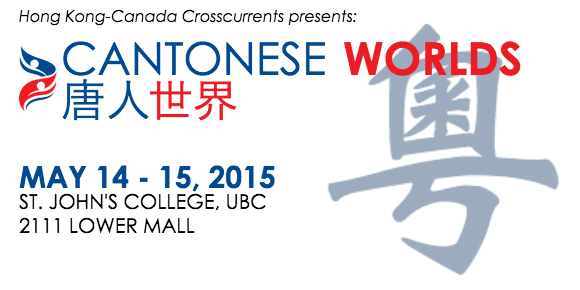
Presented by: Hong Kong–Canada Crosscurrents Project
14–15 May 2015
St. John’s College, University of British Columbia
Over the last 50 years, migrations between Hong Kong and Canada have transformed cities such as Toronto and Vancouver. Significant changes in real estate, business, philanthropy, and education, as well as cultural transformations in language, popular media, and mass consumption have reshaped societies on both sides of the Pacific. Flows of people, goods, and ideas have been multidirectional–even as hundreds of thousands of Hong Kong Chinese became Canadian citizens, Canadians of both Chinese and non-Chinese heritage also migrated to Hong Kong for work and family. Counting the estimated 300,000 Canadian passport holders living in Hong Kong would rank it among the ten largest “Canadian” cities!
The Hong Kong-Canada Crosscurrents Project looks back on the last half century in order to understand how the migration of people, goods, and ideas across the Pacific has created a complex crosscurrent of dense and sometimes surprising connections, including the transformation and re-animation of a Cantonese Pacific world that had spanned the ocean for centuries.
Cantonese Worlds is a two-day workshop that aims to begin an important conversation about how to make sense of the transformations of the last 50 years. In gathering leading scholars and observers to lay out an initial set of workshop themes for discussion, this pilot process will help create guiding questions that will shape the next few years of research, outreach, and public education. Initial themes might include, for instance, the role of the Cantonese language historically in shaping linkages between Hong Kong and Canada, or how the resurgence of Cantonese popular culture and music has been a formative element in youth identities. We invite all those interested in examining the last half century of crosscurrents between Hong Kong and Canada to participate in this important undertaking.
Keynote: “The Past, Present, and Future of Cantonese Language and Culture”
Is Cantonese a “dialect” or a “language”? is it a “culture” or a distinct “society”? Or is Cantonese something both more and less than all of these? The keynote for this workshop introduces how we might think about “Cantonese Worlds” both historically and in the present. Drawing upon the migration of peoples across the globe who spoke various forms of what we might consider “Cantonese,” we consider the “Cantonese Worlds” that have been made historically over the last 500 years, and their prospects in the present day.
[youtube]https://www.youtube.com/watch?v=ccp9q9MTs1k[/youtube]
Speakers: Henry Yu and Zoe Lam
Panel: “Musicking the Cantonese Language: From Cantonese Opera to Cantopop”
The tonal language of Cantonese plays a crucial role in the genesis, performance, and dissemination of Cantonese opera and Cantopop. An examination of the melodic and rhythmic properties of classic Cantonese operas such as Dong Dik Sang’s The Flower Princess (1957) reveals song-writing principles that in turn explain music and lyric relationships in Cantopop. Using the concept of “musicking” developed by Christopher Small, this panel plans to explore the dynamic relationships between language and music. On the one hand, it investigates the ways in which the tonal language of Cantonese provides the musical foundation for Cantonese opera and Cantopop. On the other hand, it explores the ways in which Cantonese opera and Cantopop help sustain Cantonese-speaking communities in Asia and North America.
[youtube]https://www.youtube.com/watch?v=As5VAZUs3JQ[/youtube]
Speakers: Hedy Law, Zoe Lam, and Gloria Wong
Panel: “Collecting Hong Kong”
Hong Kong, of course, exists both in reality and in imagination. To think about Hong Kong is, in part, to think through the remains and the artefacts. How then has Hong Kong been collected (and recollected)? What are the challenges and opportunities? And how has what has been collected shaped the story that is Hong Kong? In the spirit of initiating a dialogue, speakers of the panel will draw from their backgrounds and expertise to explore some of these issues.
[youtube]https://www.youtube.com/watch?v=5myYYvh9sFo[/youtube]
Speakers: Leo K. Shin, Clement Tong, Jack Leong, Allan Cho, and Eleanor Yuen
Panel: “The Past and Future of Cantonese Media”
Contemporary media studies continue to be preoccupied with the relation between media, mobility and place. On the one hand, the dissemination and consumption of media content has become ever more mobile: podcasts, youtube, instagram seem to defy boundaries and locations. On the other hand, the role of media in place-making and in forging identity and belonging seems more significant than ever before. This panel explores — from the perspectives of media producers, critics, and consumers — the past, present and future role of Cantonese media in forming and sustaining sociality and intimacy across different spaces.
[youtube]https://www.youtube.com/watch?v=xa39yRYYdCg[/youtube]
Speakers: Helen Leung, Zoe Lam, Kenneth Tung, Liam Doherty, Karin Lee, and Gabriel Yiu